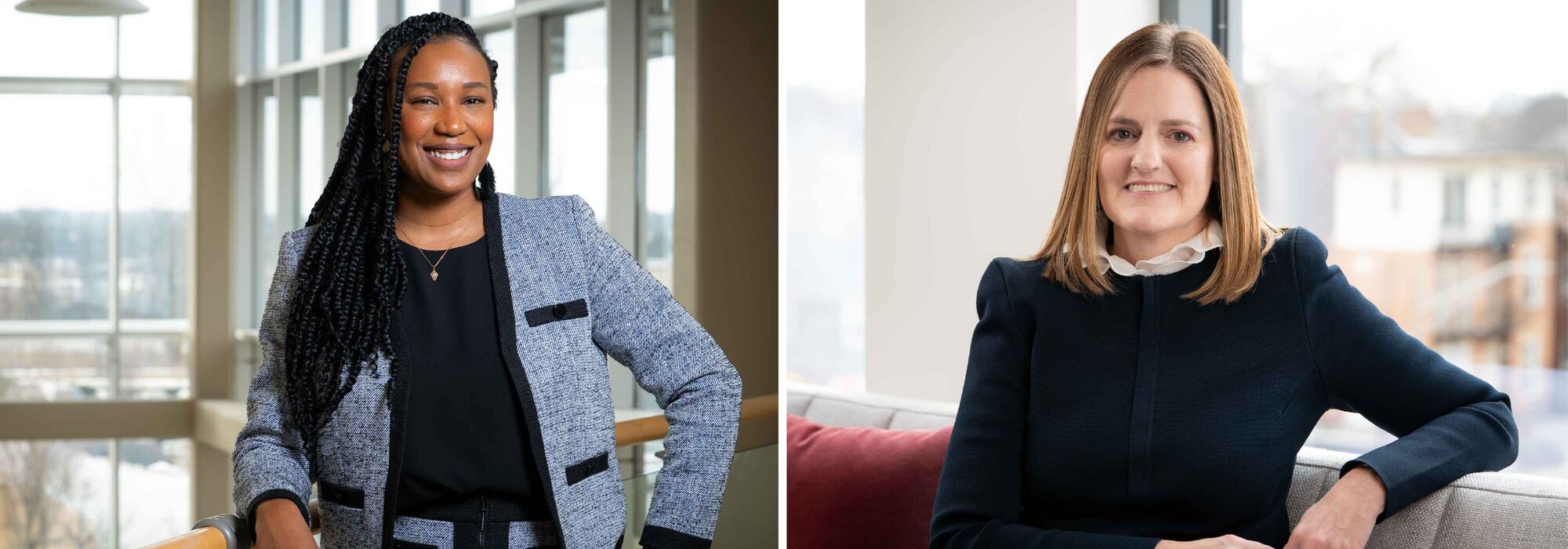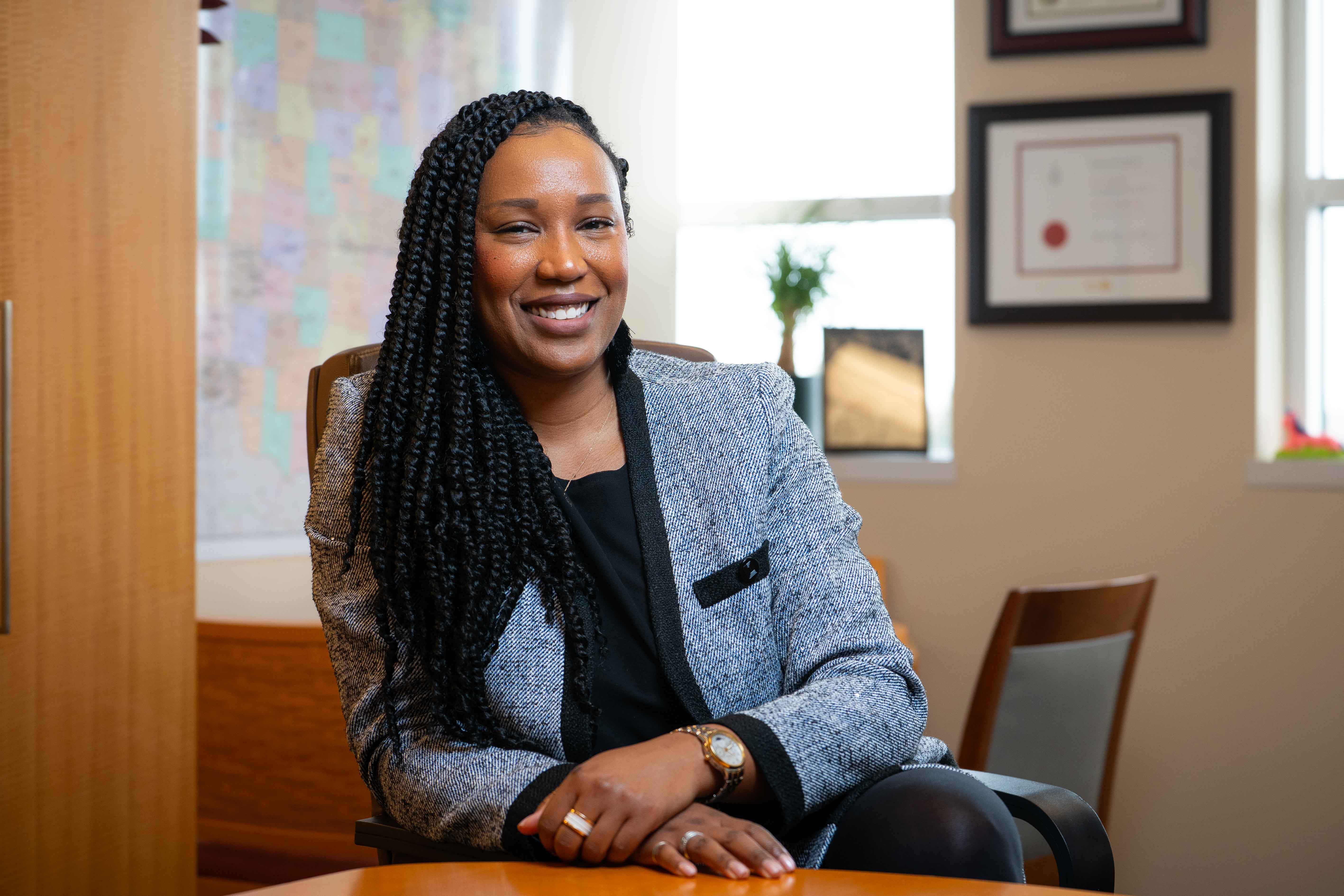
DNP Nurse Executives
by Victoria Ellwood
The College of Nursing’s top-ranked Doctor of Nursing Practice (DNP) program launched 14 years ago and has since awarded 351 degrees to graduates. We talked with two of them – one who was in the very first DNP class in 2011 and one who earned the degree just last spring. Both work in top-level executive positions in Columbus-area health systems, where they handle enormous responsibilities. Here, they reflect on their career paths, education, philosophies and, most importantly, what leadership in nursing brings to the executive table.
Dori Klemanski, DNP, APRN-CNP
Chief Advanced Practice Provider
The Ohio State University Wexner Medical Center
Dori Klemanski was working as a clinical nurse practitioner in oncology at Ohio State Wexner Medical Center (OSUWMC) when the College of Nursing first launched its DNP program.
“When the college offered that first class, I wanted to do it for my own personal growth. Being in a clinical environment you are very focused on the patient, but there are situations where you can provide contributions in other ways, such as asking very deep practice questions or looking at system challenges. At the time, the concept of cancer survivorship was coming into its own. I thought pursuing my DNP might give me a broader understanding and background. It might let me take what I know clinically and do program development, to use foundations I had gained from the DNP courses to help (make advances) in terms of cancer treatment and to provide patients a holistic and comprehensive well-being plan.
“That’s when things really began to galvanize in my head,” she added. “I had been an NP for a few years and started to see there were larger, compelling issues that could have an impact from advance practice nurses.”
Klemanski was among the dozen first graduates of the brand-new DNP program in 2011.
Today, Klemanski is the chief advanced practice provider for OSUWMC. “I oversee all of the advanced practice providers, including nurse practitioners, physician assistants, certified nurse midwives and clinical nurse specialists. There are just under a thousand people employed in these positions at the medical center, and my role is to ensure administrative oversight and clinical practice oversight and employee proxies. I am the first in this role. It’s the first time the health system has supported advanced practice from an enterprise perspective rather than from a business unit.”
“We always come from a patient-centered perspective. That’s our guiding framework.”
- Dori Klemanski
Klemanski said her experiences as a bedside nurse and as a nurse practitioner guide her. “Having a very strong clinical background is important not only to support those in advanced practice roles, but also as a lens that we always come from a patient-centered perspective. That’s our guiding framework. Understanding both clinical aspects and clinical operations has been incredibly beneficial,” she said. “Finding the intersection between what direct patient care providers need and balancing that with the needs of the institution is crucial.”
She added, “I try very hard to make the staff feel empowered. We are advanced practice providers and we advocate daily to ensure our contributions at Ohio State, around the state and in the nation speak to how important our role can be.”
What is most rewarding to Klemanski? “From my larger role professionally, it’s satisfying to see the system administrative structure in place. APP administrative structures in which APPs report to APP leaders are becoming more prevalent nationally. OSUWMC was an early adopter,” she said. “It really does allow us to have a unified and cohesive voice as a profession.”
Klemanski continues to operate a small clinical practice too, and added, “On a very personal level, when I see patients in the clinical setting, it is a very rewarding moment that reminds me what we do. It is a way to keep my clinical spirit renewed, because I am affecting lives. It keeps me grounded.”

Keeli Stith, DNP, RN, NEA-BC
Senior Director of Operations
OhioHealth – Dublin Methodist Hospital and Grady Memorial Hospital
Keeli Stith oversees all operational departments including support and shared services at OhioHealth’s Dublin Methodist and Grady Memorial hospitals. Additionally, she is responsible for managing Dublin Cancer Center, Delaware Health Center and Lewis Center Free Standing Emergency Department.
“I report directly to the hospital president and my responsibilities encompass all operational aspects, both external and internal to the hospital buildings,” she said. “In this role, my responsibilities include ensuring financial stewardship, driving service efficiency and aligning daily operations with the OhioHealth overall strategy. I collaborate with various support and shared services including environmental services, laboratory, pharmacy, facilities, protective services, radiology, clinical staff and multiple other disciplines.”
Stith manages this responsibility effectively due to her background in nursing. “I lead from a customer-service perspective,” she explained. “Nurses advocate for patients and families effectively and I consider what is best for them across all disciplines, not just nursing. My main goal as a leader is to ensure that everyone, whether from environmental services, facilities or protective services, keeps patients at the forefront. I act as the translator, helping non-nursing staff understand how their roles impact patient care indirectly.”
Stith’s career plan didn’t originally include nursing. “To be honest, I aspired to be a pharmacist,” she said, but turned to nursing after her mom – who had been a candy striper growing up – convinced her to consider it. “I didn’t find nursing; nursing found me,” she said.
“Ohio State and the DNP program have empowered me as a nurse executive.”
- Keeli Stith
Her previous career includes being a critical care nurse, a nurse educator and a primary care nurse practitioner. She holds a master’s degree in nursing and accumulated 13 years of experience in hospital leadership while living in Toronto, Canada. In 2020, she assumed a newly created role of associate director of perioperative services at The Ohio State University Wexner Medical Center. Two years later, midway through her DNP program, Stith took her current role at OhioHealth and her experiences coupled with academics fell into place.
“I thoroughly enjoyed the healthcare policy course offered in the DNP program,” she said. “The course inspired me to envision how I could influence health policy as a nurse executive. The DNP program provided me with the confidence to advocate for implementation of evidence-based healthcare initiatives to guide program planning and achieve operational execution, ultimately attaining long-term sustainable changes.”
Stith highlights the leadership roles of nurses at her hospital as evidence of their capability to lead in the C-suite. She stated, “I am the only DNP among senior directors of operations at OhioHealth hospitals, showing that doctorally prepared nurses can hold executive positions. Our hospital president and CEO is also a doctorally prepared nurse, demonstrating that nurses can lead hospitals.”
“Ohio State and the DNP program have empowered me as a nurse executive,” she said. “It is an honor to be addressed as ‘Dr. Keeli Stith from The Ohio State University.’ ”
- Online Excellence
- Local Outreach: Helping Head Start
- DNP Nurse Executives
- Predicting Preterm Birth Risk
- Buckeye Inspiration: Teresa DiMeo
- In Memoriam
- Be the One
- The Great FLO Race
- Student Life: Briana Gordon
- Student Life: Cole Sullivan
- Celebrating the Class of 2025
- Grants Roundup
- Analyzing Fertility-tracking Technology Use
- Fuld Focus
- Alumni in Action: Diana Kupchella
- Water for Emotional Wellness
